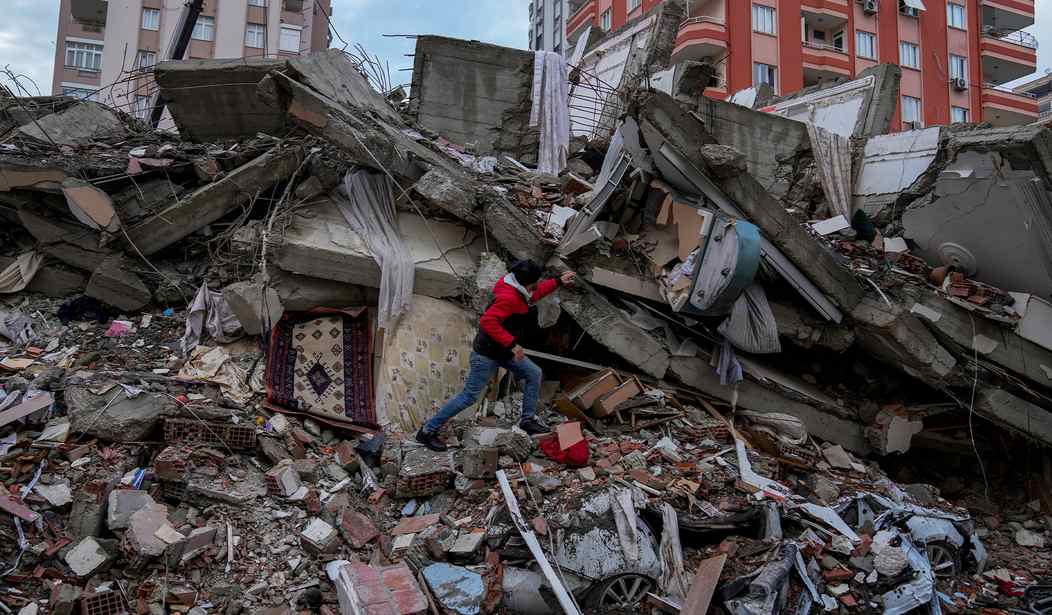The grim news out of Turkey is getting grimmer. The death toll from the pair of devastating earthquakes that struck the country on Monday has passed 17,500 and is certain to go much higher. The World Health Organization put the number of people affected by the disaster at 23 million.
While Turkey at least has some kind of infrastructure to deal with the catastrophe, Syria was also in the quake zone, and after 12 years of civil war and terrorism, has little in the way of help it can offer its citizens.
The WHO estimates that 6,000 buildings collapsed — most of them with people still inside. And that’s a political problem for Turkey’s autocratic , resident, Recep Tayyip Erdogan. Many people are asking why Turkey, which has regularly suffered from devastating earthquakes in the past, had so many structures unable to withstand the temblors.
There was apparently nothing wrong with the building codes, but corruption runs deep in Turkey, and the codes are only as good as the inspectors enforcing them.
“The maximum intensity for this earthquake was violent but not necessarily enough to bring well constructed buildings down,” says David Alexander, professor of Emergency Planning and Management at University College London.
“In most places the level of shaking was less than the maximum, so we can conclude out of the thousands of buildings that collapsed, almost all of them don’t stand up to any reasonably expected earthquake construction code.”
Turkey has a unique system where “construction amnesties” are granted for thousands of buildings not up to code.
Up to 75,000 buildings across the affected earthquake zone in southern Turkey have been given construction amnesties, according to Pelin Pınar Giritlioğlu, Istanbul head of the Union of Chambers of Turkish Engineers and Architects’ Chamber of City Planners.
Just a few days before the latest disaster, Turkish media reported that a new draft law is awaiting parliamentary approval which would grant a further amnesty for recent construction work.
Geologist Celal Sengor said earlier this year that passing such construction amnesties in a country riven by fault lines amounts to a “crime”.
The architect of these construction amnesties is Erdogan, who is being blamed for the lax standards. About 13 million non-compliant buildings across Turkey have since become legal thanks to the procedure, according to industry estimates.
For Erdogan, who is facing a difficult re-election fight in May, the earthquake couldn’t have come at a worse time. The pandemic wreaked havoc on Turkey’s economy, which has yet to recover. On top of that, inflation is at a staggering 57%, down from 80% in November. But it’s his controversial economic response to the inflation that could send Turkey into an economic disaster.
Mike Harris, the founder of Cribstone Strategic Macro, told CNBC on Tuesday that Erdogan had “lost control of the narrative” on the building codes and is likely to lose it on the economy as well.
Harris described the president created “this weird situation where inflation is running at 80%, but he needs to keep the currency stable between now and the election.”
Through very unorthodox policies, Erdogan has “found a very creative way, a very costly way, to de-dollarize the economy, basically,” he said, giving examples like allowing Turks to keep their bank deposits at a 13% interest rate, then promising to cover their losses, if the currency drops further.
Harris boldly predicted: “Actually, the currency has to collapse if he wins, because there will be no confidence and he’s created this artificial scenario that can’t be sustained for a prolonged period of time.”
Usually, a leader in political trouble looks to shower the voters with goodies in the lead-up to the election. But the earthquake has scotched those plans, which included raising salaries and lowering the pension age.
The opposition in Turkey is still factionalized, and unless they unite behind one candidate, Erdogan is likely to slip through to victory. And Turkey will be many years rebuilding, which will lead to more opportunities for Erdogan to pay off important backers and maintain power.
As angry as the people are at Erdogan for the slow response to the crisis and the building code fiasco, it’s a pretty good bet that the Turkish strongman will find a way to stay in power — one way or another.










